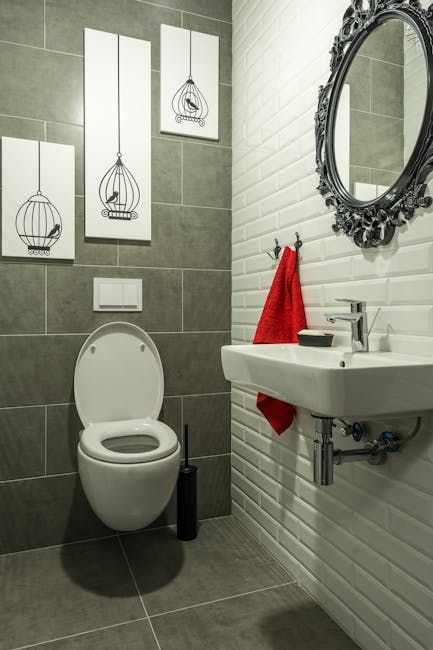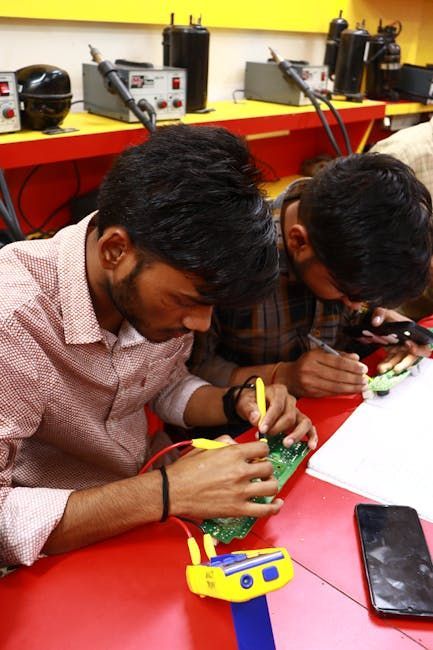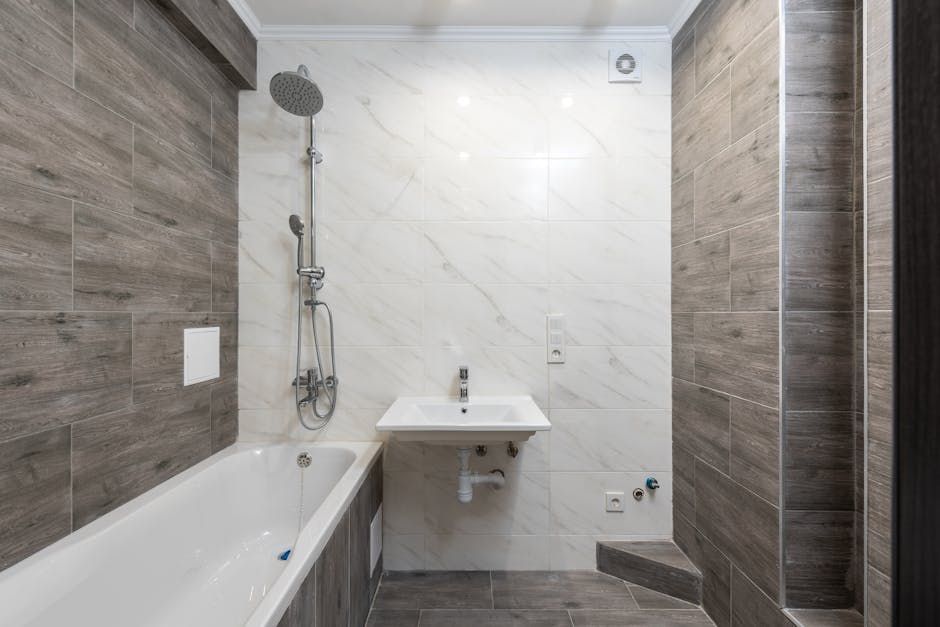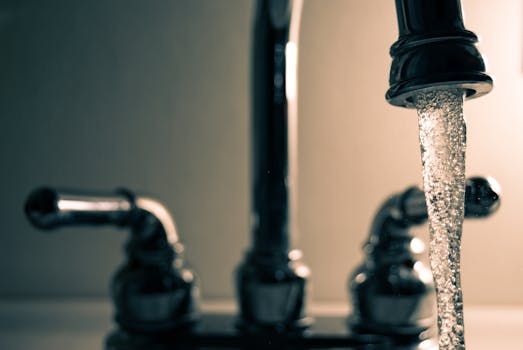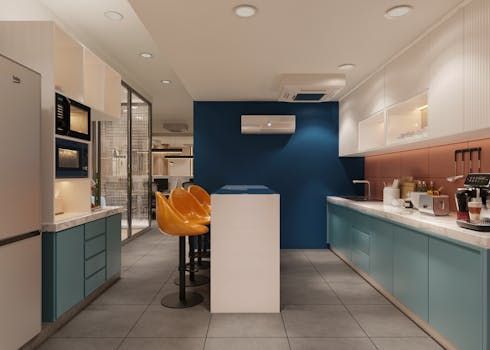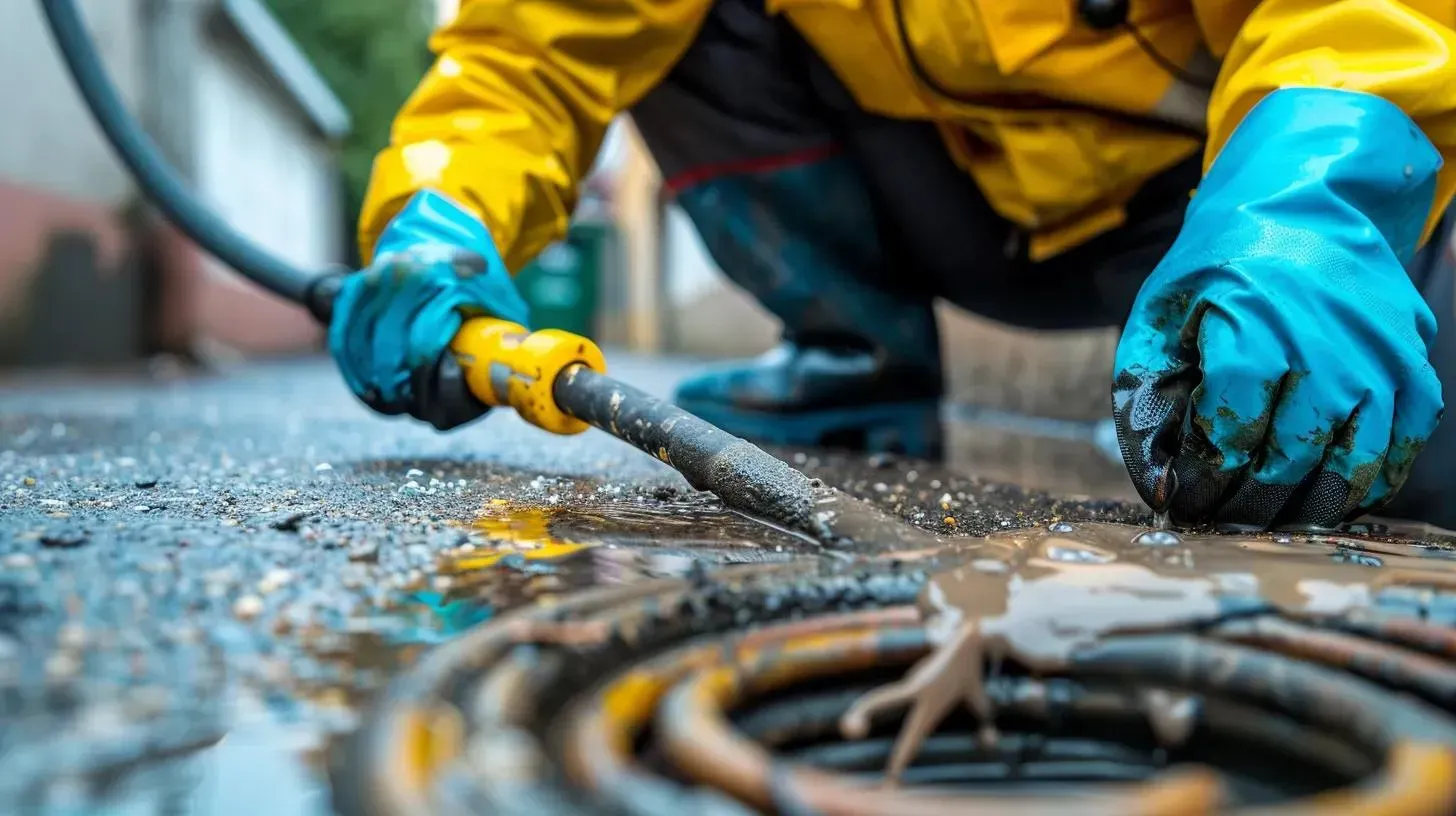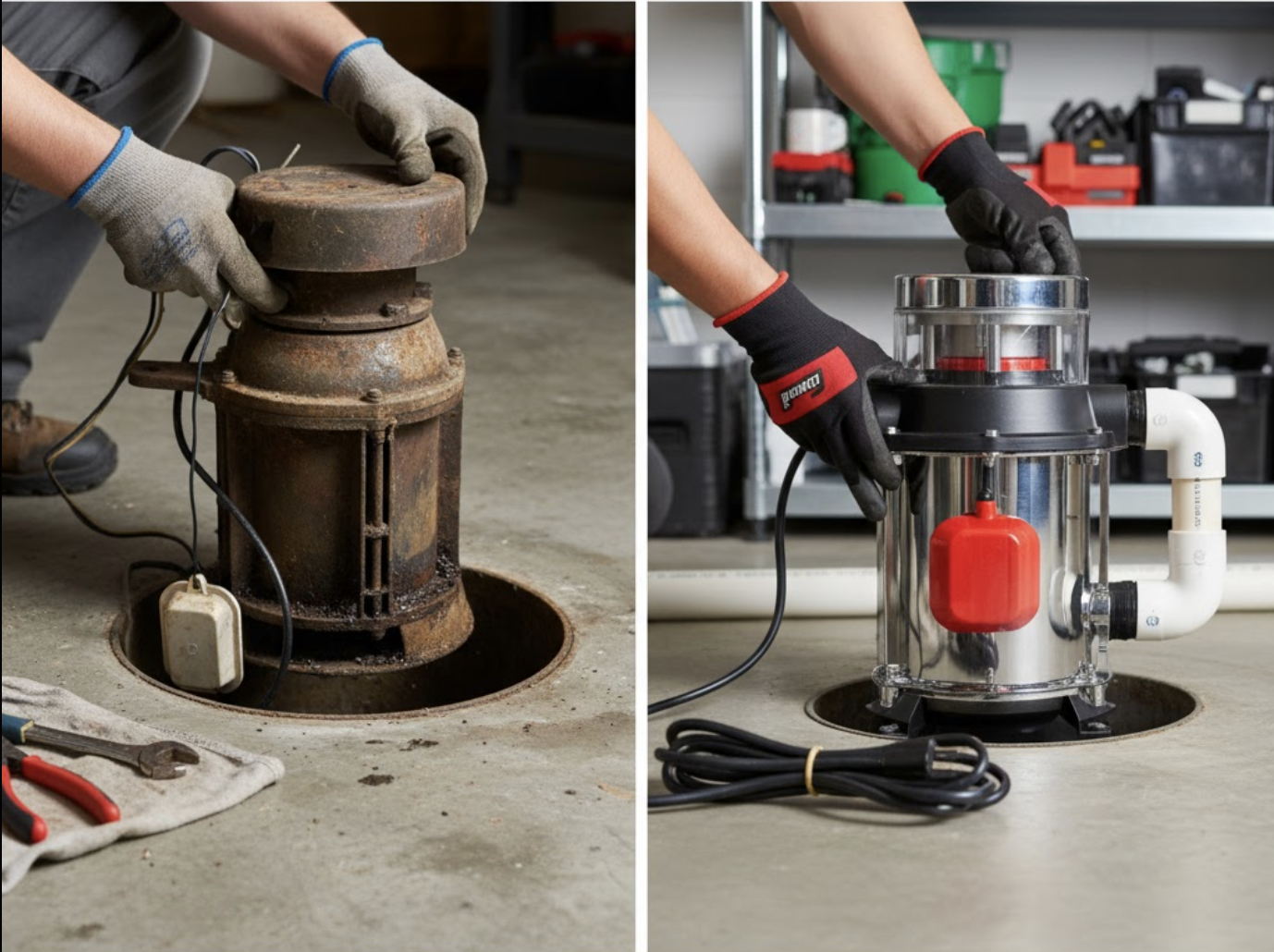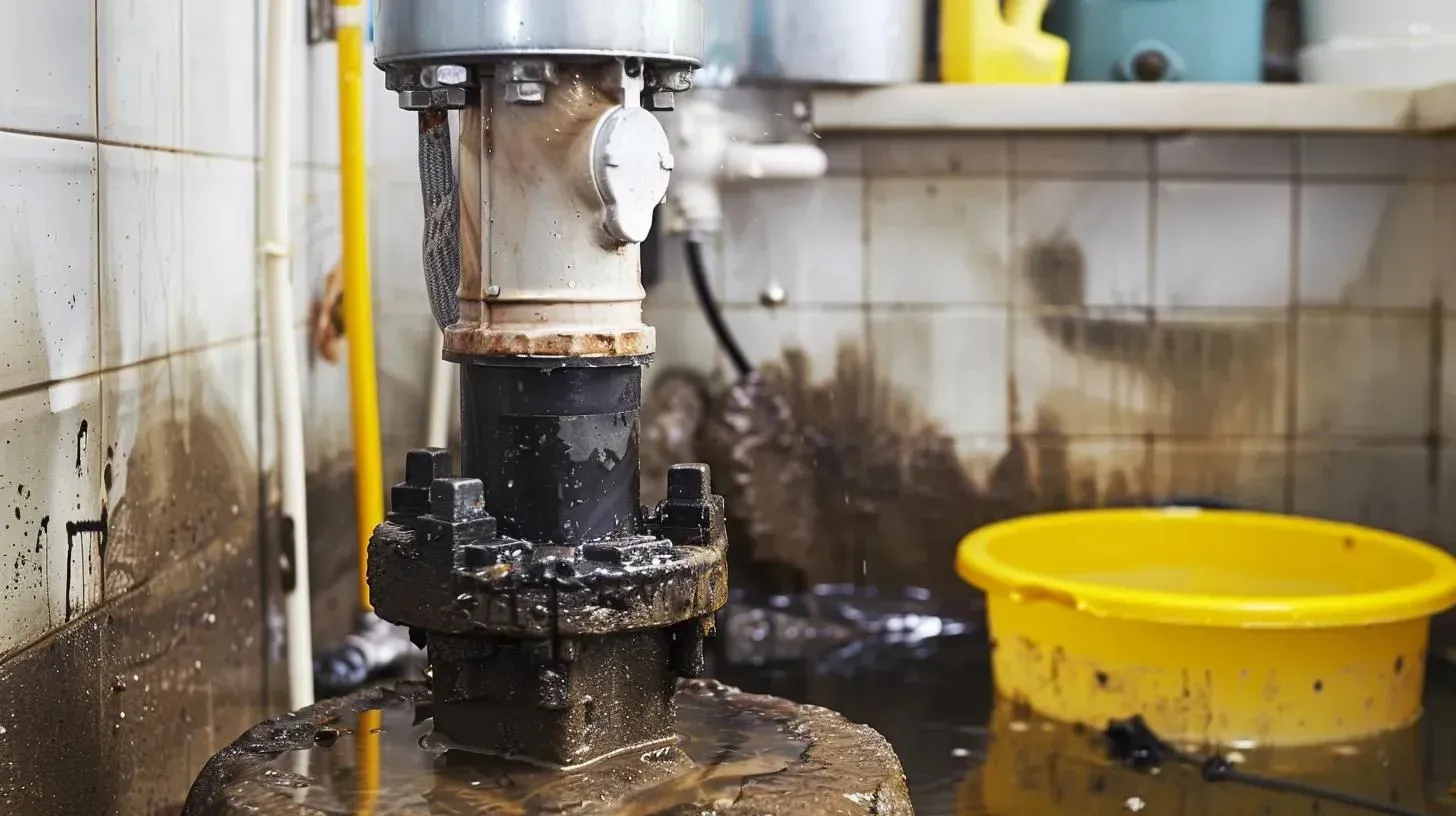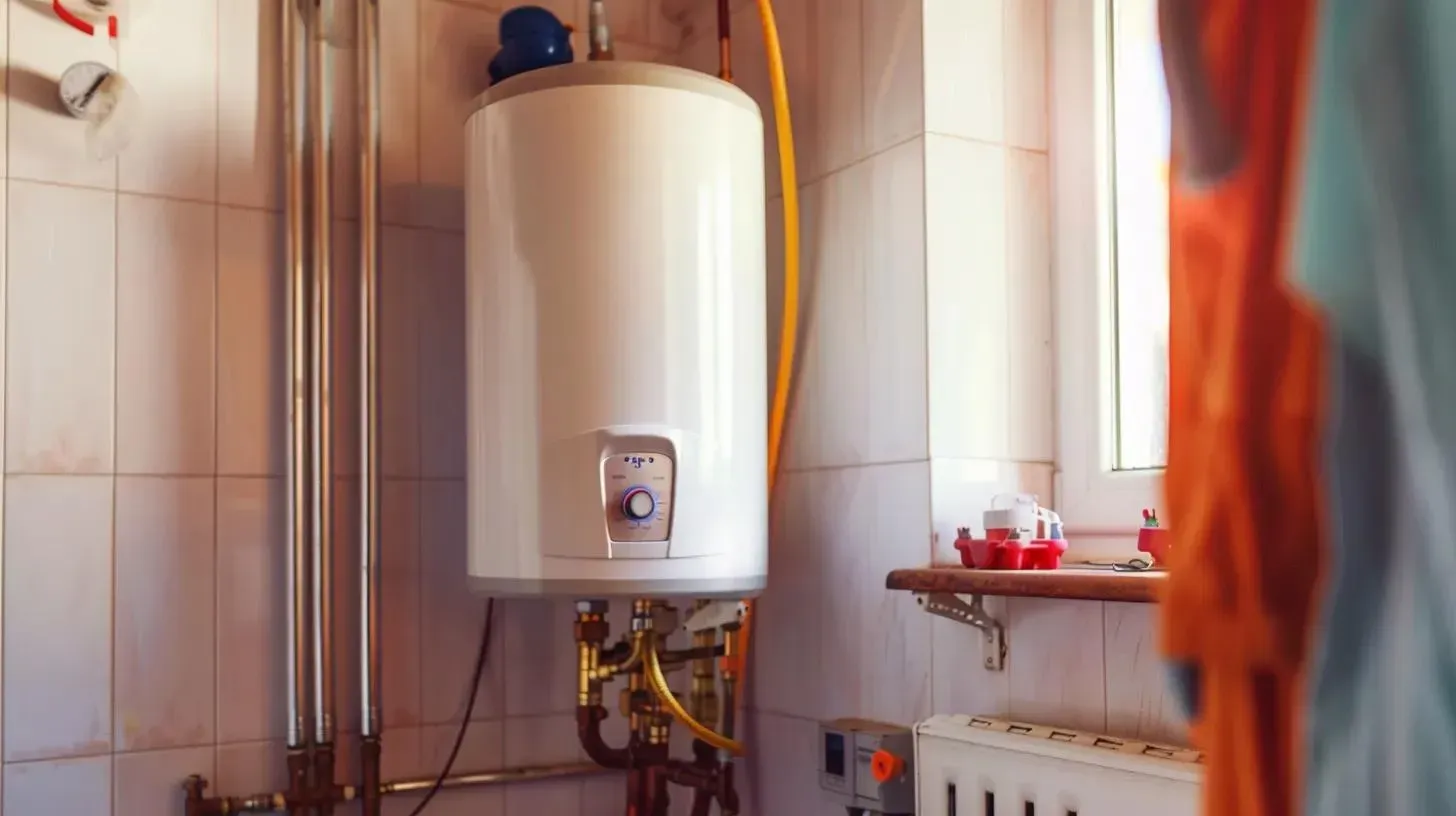Don't Get Drained by Plumbing Issues – Your Guide to Commercial Plumber Maintenance
Why Commercial Plumber Maintenance Is Critical for Your Business
Plumber maintenance is essential for commercial properties to prevent costly emergencies, ensure regulatory compliance, and protect your bottom line. Regular maintenance can save thousands compared to emergency repairs while keeping your business running smoothly.
Essential Commercial Plumber Maintenance Schedule:
- Monthly: Check for visible leaks, test faucet aerators, inspect floor drains
- Quarterly: Service grease traps, test water pressure (40-60 psi), exercise valves
- Annually: Flush water heaters, camera inspect sewer lines, certify backflow devices
- Emergency: Know main shut-off locations, maintain 24/7 professional contact
Commercial plumbing systems face unique challenges that residential properties simply don't encounter. High-traffic restrooms, industrial-grade water heaters, complex drain networks, and strict health codes create a perfect storm for expensive problems. According to industry data, plumbing repairs average $175 to $450, but major commercial plumbing issues can cost thousands - making prevention far more cost-effective than reaction.
The stakes are higher in commercial settings. A single burst pipe can shut down operations, damage inventory, and violate health department requirements. Leaks waste almost 1 trillion gallons of water annually in the United States, with commercial properties contributing significantly to this waste through undetected issues.
Smart facility managers know that proactive plumber maintenance isn't just about avoiding disasters - it's about optimizing energy costs, maintaining property values, and ensuring tenant satisfaction. Regular maintenance extends equipment life, reduces utility bills, and demonstrates due diligence to insurance providers.
I'm Mike Martinez, owner of Accountable Home Plumbing, and I've spent years helping Denver-area businesses avoid plumbing catastrophes through strategic plumber maintenance programs. My team understands that every hour of downtime costs money, which is why we focus on prevention rather than expensive emergency responses.
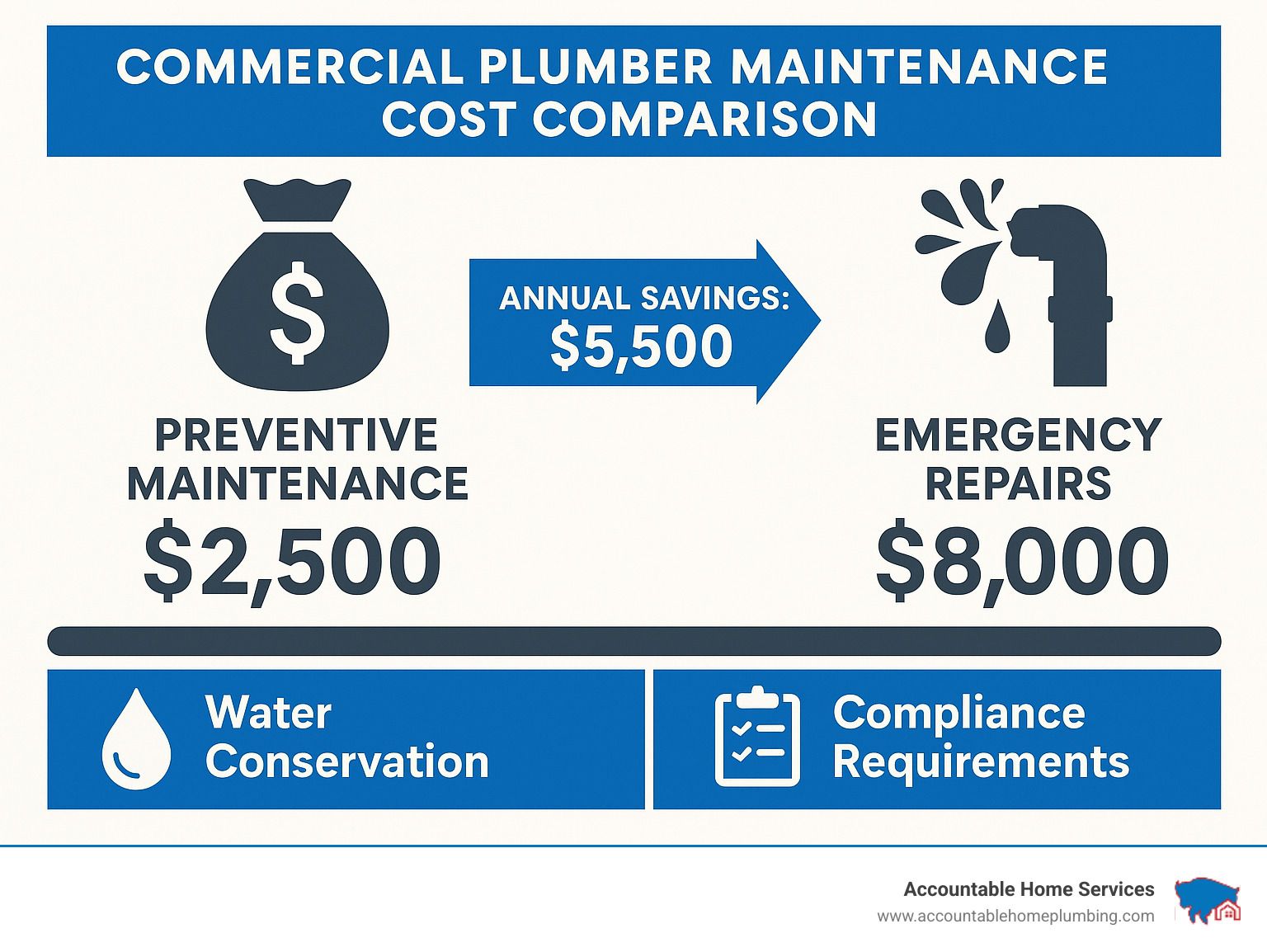
Why Commercial Plumber Maintenance Protects Your Bottom Line
Let's be honest - as a business owner, you care about your bottom line. The good news? Smart plumber maintenance isn't just another expense on your books. It's actually one of the smartest investments you can make, protecting your profits through water conservation, property value protection, code compliance, and reputation management.
Think about water waste for a moment. A single household with leaks can waste almost 10,000 gallons of water per year. Now imagine that in a commercial building with dozens of fixtures, multiple restrooms, and heavy daily use. One tiny drip per minute from just one faucet adds up to 34 gallons per year. Multiply that across your entire facility, and you're looking at water bills that could fund a nice vacation instead.
Your plumbing system represents roughly 15% of your total property value. That's not pocket change. When you neglect maintenance, you're not just risking immediate repair costs - you're potentially damaging a major asset. Think of regular plumber maintenance as protecting your investment, just like you would with any other valuable equipment.
Then there's compliance. Commercial properties must meet EPA standards, ADA requirements, and local inspection protocols. Nobody wants a surprise visit from inspectors when your systems aren't up to code. Regular maintenance keeps you audit-ready and helps you sleep better at night.
The True Cost of Neglecting Plumbing
I've seen what happens when businesses try to "save money" by skipping maintenance. Spoiler alert: it never ends well. What starts as a small leak quietly becomes a mold problem. That slow-draining sink eventually becomes a sewage backup during your busiest day of the week.
Mold remediation can cost thousands and might force you to close temporarily. Structural damage from water infiltration affects your foundation, flooring, and walls. Inflated utility bills from hidden leaks can drain your profits for months before anyone notices. And business interruption during emergency repairs? That means lost revenue, frustrated customers, and potential liability issues.
Here's a reality check: cleaning or descaling a main sewer line costs between $175 and $475. But if you wait until that line is damaged from neglect or tree roots, you could be looking at $6,300 for repairs. The math isn't complicated - prevention wins every single time.
Environmental & Legal Stakes
Today's business environment demands environmental responsibility and legal compliance. EPA standards for water conservation and waste management keep evolving. ADA restroom requirements mandate specific fixture types and accessibility features. Local inspections can uncover violations that result in fines, mandatory upgrades, or even operational restrictions.
We help businesses throughout the Denver Metro area stay ahead of these requirements through proactive maintenance programs. Regular inspections, proper documentation, and preventive care show environmental stewardship while protecting you from legal headaches. It's much easier to maintain compliance than to scramble to fix violations after they're finded.
Building-Wide Plumber Maintenance Checklist & Schedule
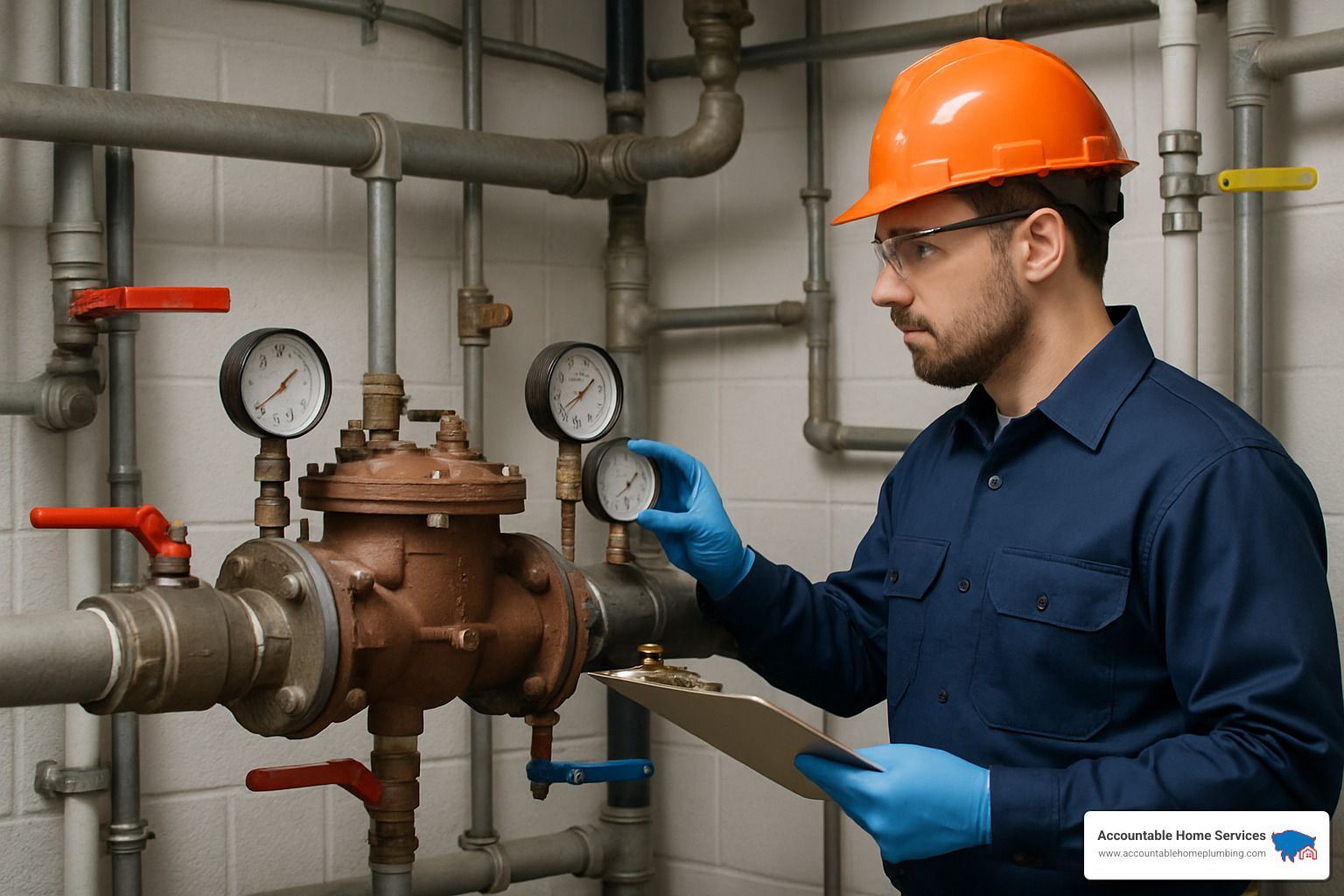
Creating a systematic approach to plumber maintenance is like having a roadmap for your building's health. After working with countless Denver-area businesses, I've learned that the most successful facilities follow a structured schedule that catches problems early and keeps systems running smoothly.
The secret isn't just knowing what to check - it's knowing when to check it. Our Plumbing Maintenance Checklist has helped facility managers across Westminster and Thornton transform reactive fire-fighting into proactive system care.
Think of it this way: monthly tasks are your early warning system, quarterly inspections dig deeper into hidden problems, and annual audits ensure everything meets code and runs efficiently. Each level builds on the last, creating a safety net that prevents expensive surprises.
We also recommend practicing shutdown drills quarterly so your staff knows exactly where main valves are located and how to respond during emergencies. When water is gushing from a broken pipe, you don't want people hunting around for the shut-off valve.
Monthly Essentials for High-Use Facilities
High-traffic facilities need monthly attention because problems develop fast when hundreds of people use the same fixtures every day. I always tell facility managers to focus on what they can see and access easily - these monthly checks shouldn't require special tools or hours of time.
Faucet aerators might seem like small details, but they're actually your first line of defense against user complaints. When aerators get clogged with mineral deposits, water sprays everywhere except where it should go. Check for reduced flow, weird spray patterns, or that telltale white buildup around the threads. A simple monthly cleaning keeps users happy and prevents unnecessary service calls.
Visible leak checks should become second nature for your maintenance team. Look under every sink for moisture, water stains, or that musty smell that screams "hidden leak." Pay special attention to toilet bases - if the flooring feels soft or you see water stains, the wax seal is probably failing. A toilet that slowly leaks water can waste 30 gallons per day, and when you multiply that across multiple units, you're literally watching money flow down the drain.
Floor drains in commercial restrooms take a beating from hair, soap scum, and things people really shouldn't be putting down drains. Our Routine Drain Maintenance guide shows you how to keep these flowing without using harsh chemicals that can damage pipes or violate environmental regulations.
Quarterly Deep Dives
Every three months, it's time to look beyond the obvious and check systems that don't show problems until they become emergencies. These tasks might require some specialized knowledge, but they prevent the kind of failures that shut down operations.
Grease traps in commercial kitchens are like ticking time bombs when neglected. I've seen restaurants forced to close because backed-up grease traps violated health codes. Quarterly service keeps grease from solidifying in your pipes and prevents those nightmare scenarios where sewage backs up during your busiest dinner rush.
Water pressure testing protects your entire system from damage. Most commercial fixtures work best between 40-60 psi, but anything regularly above 80 psi starts causing leaks and premature wear. Commercial buildings often have complex pressure zones, so this testing helps identify problems before they damage expensive equipment.
Sump pumps sit quietly in basements until the day you desperately need them. Quarterly testing with a bucket of water verifies the pump activates and drains properly. Trust me, you don't want to find your sump pump failed during the next heavy storm.
Valve exercising might sound boring, but it's crucial for emergency preparedness. Valves that haven't been turned in months can seize up, leaving you unable to shut off water during a crisis. Regular exercising keeps everything functional and identifies valves that need replacement before they fail at the worst possible moment.
Annual & Bi-Annual Must-Dos
Once or twice a year, it's time for the big-picture maintenance that keeps major systems healthy and compliant. These tasks usually require professional expertise, but they're investments that pay for themselves by preventing catastrophic failures.
Water heater flushing removes the sediment buildup that slowly kills efficiency and shortens equipment life. Commercial water heaters work much harder than residential units, so they accumulate sediment faster. Our Routine Water Heater Maintenance program includes annual flushing, anode rod inspection, and efficiency testing that keeps your hot water flowing and your energy bills reasonable.
Sewer camera inspections are like getting an X-ray of your building's underground arteries. Tree roots, pipe deterioration, and debris accumulation are invisible until they cause expensive backups. Annual camera inspections reveal these problems early when they're still manageable and affordable to fix.
Backflow device certification isn't optional - it's required by law in most commercial properties. These devices prevent contaminated water from entering the municipal supply, and annual testing by certified professionals keeps you compliant and protects public health. Skip this, and you risk fines, violations, and serious liability issues.
Detecting & Preventing Leaks, Clogs, and Pressure Problems
The best plumber maintenance happens before you can see the problem. Smart facility managers use technology and proven techniques to catch issues early, saving thousands in emergency repairs and water waste.
Think of it like a health checkup for your building. Just as regular medical screenings catch problems before symptoms appear, modern leak detection and prevention strategies identify plumbing issues while they're still manageable and affordable.
Water meter monitoring is your first line of defense against hidden leaks. Check your meter readings monthly and look for unusual patterns. If water usage spikes unexpectedly or the meter shows continuous flow during closed hours, you've likely got a leak somewhere in the system. We've seen clients find leaks that had been running for months, wasting thousands of gallons and dollars.
Smart sensors and water meters provide real-time data about your plumbing system's health. These tools can alert you to pressure changes, unusual flow patterns, or moisture in areas where it doesn't belong. The investment in monitoring technology pays for itself quickly when it prevents major water damage.
Dye tests offer a simple way to check for toilet leaks that waste enormous amounts of water silently. Drop food coloring into the toilet tank and wait thirty minutes without flushing. If color appears in the bowl, you've found a leak that could be wasting hundreds of gallons monthly. According to EPA research on national leak waste, these small leaks contribute to nearly 1 trillion gallons of wasted water annually across the United States.
Strainers in floor drains and sinks catch debris before it becomes a clog. Enzyme cleaners break down organic buildup naturally without the harsh chemicals that can damage pipes or create environmental hazards.
Leak-Hunting Tactics Every Facility Manager Should Know
Silent toilet leaks are the ninjas of water waste - they do their damage quietly and persistently. In busy commercial facilities, these leaks often go unnoticed for months because no one hears the telltale running water sound over ambient noise. Regular dye testing across all toilets should be part of your monthly routine.
Irrigation lines present unique challenges because they're buried and only used seasonally. Look for unusually green patches of grass, soggy areas that don't dry out, or mysterious spikes in your water bill during watering season. Underground leaks can run for months before surfacing, literally washing money down the drain.
Mechanical seals in pumps, water heaters, and other equipment gradually wear out and develop small leaks. These areas need regular visual inspection because small drips can become major problems quickly. Check around equipment bases for water stains, mineral deposits, or rust that indicates ongoing moisture issues.
Infrared imaging technology lets professionals see moisture behind walls without tearing anything apart. This non-invasive technique identifies hidden leaks that might otherwise remain undetected until they cause major damage. It's like having X-ray vision for your plumbing system.
Keeping Drains Flowing Without Chemicals
Chemical drain cleaners might seem convenient, but they're often too harsh for commercial plumbing systems and can create bigger problems than they solve. The chemicals can damage pipe materials, create toxic fumes in enclosed spaces, and harm the environment when they enter wastewater systems.
Baking soda and vinegar treatments work surprisingly well for routine maintenance and minor clogs. Start with hot water to soften buildup, add baking soda, then vinegar. The natural reaction breaks down organic matter without damaging pipes or creating hazardous conditions.
Hydro jetting uses high-pressure water to blast away stubborn blockages and clean pipe walls thoroughly. This professional technique removes grease, scale, and debris more effectively than chemicals, making it perfect for commercial kitchens and high-traffic facilities. The process is environmentally friendly and actually cleans pipes rather than just punching holes through clogs.
Floor-sink maintenance in commercial kitchens requires special attention because these drains handle everything from grease to cleaning chemicals. Regular cleaning and proper staff training prevent the buildup that leads to expensive backups and health code violations.
Grease-trap discipline prevents most commercial kitchen drain problems before they start. Train your staff to scrape plates thoroughly, never pour grease down drains, and dispose of food waste properly. An ounce of prevention here saves pounds of cure later.
Managing Safe Water Pressure in Multi-Story Buildings
Multi-story commercial buildings face a unique balancing act with water pressure. Upper floors need enough pressure for proper function, while lower floors can experience excessive pressure that damages fixtures and wastes water.
Pressure-reducing valves act like traffic cops for your water system, regulating flow to different building zones. These devices need annual testing and occasional adjustment to maintain optimal pressure throughout your building. Proper pressure management protects fixtures and ensures consistent performance.
Expansion tanks handle the pressure fluctuations that occur when water heats up and expands or when pumps cycle on and off. Think of them as shock absorbers for your plumbing system. Properly sized and maintained expansion tanks prevent pressure spikes that can damage pipes and create leaks.
Booster pumps ensure adequate pressure reaches upper floors in tall buildings. Regular maintenance keeps these pumps running efficiently and prevents the pressure drops that lead to tenant complaints and reduced fixture performance.
Meter data logging tracks pressure patterns over time, revealing trends that indicate developing problems. Professional analysis of this data helps optimize system performance and catch issues before they become emergencies. It's like having a continuous health monitor for your building's circulatory system.
Seasonal Strategies & Emergency Preparedness for Commercial Properties
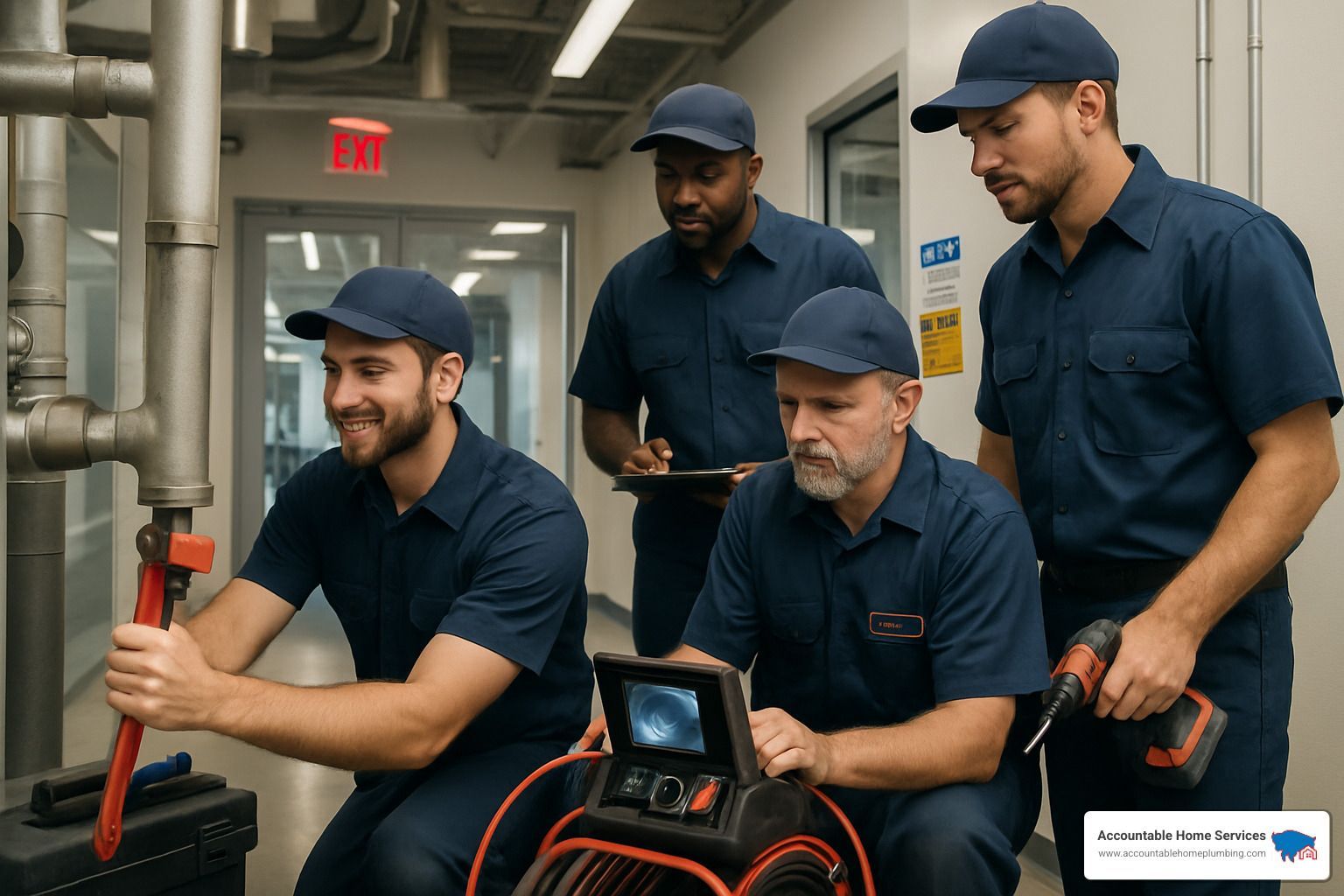
Living in Colorado means your commercial property faces some serious weather challenges. One day it's 70 degrees, the next day you're dealing with a blizzard. These wild temperature swings can wreak havoc on plumbing systems, especially in commercial buildings where a single failure affects dozens of people and can shut down your entire operation.
Smart plumber maintenance means thinking ahead. Winter freeze protection, summer irrigation demands, and spring storm surges all require different strategies. The good news? A little preparation goes a long way toward preventing expensive emergencies.
I've seen too many business owners learn this lesson the hard way. A frozen pipe that bursts in a restaurant kitchen doesn't just mean calling a plumber - it means lost revenue, spoiled food, unhappy customers, and potential health code violations. That's why we always tell our clients: prepare for the worst, hope for the best.
Winterization to Stop Frozen Pipe Disasters
When temperatures drop below freezing in the Denver Metro area, pipe insulation becomes your best friend. Commercial properties face unique risks because you've got more exposed pipes, larger water volumes, and higher stakes if something goes wrong.
Start with the obvious spots: any pipes in unheated areas, along exterior walls, or in mechanical rooms need proper protection. Foam pipe wrap is your basic defense, but don't forget about heat-trace cables for the really vulnerable areas. These electrical heating elements keep water moving even when Mother Nature throws her worst at you.
Here's something many facility managers miss: strategic dripping protocols. You can't just turn on any faucet like you would at home. Commercial buildings need a plan that protects critical systems without turning into a water-wasting disaster. Know which faucets to drip, how much, and for how long.
Our Routine Plumbing Maintenance program includes comprehensive winterization that takes the guesswork out of freeze protection. We've been through enough Colorado winters to know exactly what works and what doesn't.
Hot-Water System Care for Peak Efficiency
Commercial water heaters work about ten times harder than the one in your house. They're heating water all day long for restrooms, kitchens, and cleaning operations. That means they need more attention, but it also means the payoff from proper maintenance is huge.
Sediment buildup is the silent killer of commercial water heaters. All that hard Colorado water leaves mineral deposits that make your system work harder and die younger. Annual flushing removes this buildup and can extend your equipment life by years, not months.
Don't forget about anode rods - these little sacrificial elements protect your tank from corrosion. In commercial settings, they wear out faster because of the constant use. A $50 anode rod replacement can prevent a $5,000 tank replacement. That's what I call a good investment.
Keep your thermostat at 120°F for the sweet spot between energy efficiency and adequate hot water. Any hotter and you're wasting energy plus creating scalding risks. Any cooler and you might not meet health department requirements.
According to research from Energy.gov, proper water heater insulation can reduce standby heat loss by 25-45%. For commercial properties with big hot water demands, that translates to real money in your pocket every month.
Emergency Response Playbook
Murphy's Law applies especially well to commercial plumbing: if something can go wrong, it will go wrong at the worst possible moment. Usually at 2 AM on a holiday weekend when you're out of town.
Know where your main shut-off valves are and make sure your staff knows too. Post clear maps in multiple locations. When a pipe bursts, every second of flowing water means more damage and higher costs. Train your team on basic shut-off procedures so they can act fast while waiting for professional help.
Burst-pipe containment isn't glamorous, but it saves thousands in damage. Keep tarps, buckets, and absorbent materials where staff can find them quickly. Have a clear plan for protecting inventory, equipment, and important documents.
Pre-arrange your emergency contacts before you need them. Program numbers for emergency plumbing, water damage restoration, and your insurance company into multiple phones. Post them where anyone can find them during a crisis. Trust me, you don't want to be googling "emergency plumber" while water is pouring through your ceiling.
The key to emergency preparedness is thinking through scenarios before they happen. What would you do if the main water line broke? How would you protect your most valuable equipment? Who would you call first? Having these answers ready makes all the difference when disaster strikes.
Hiring the Right Pro: When DIY Ends and Professional Plumber Maintenance Begins
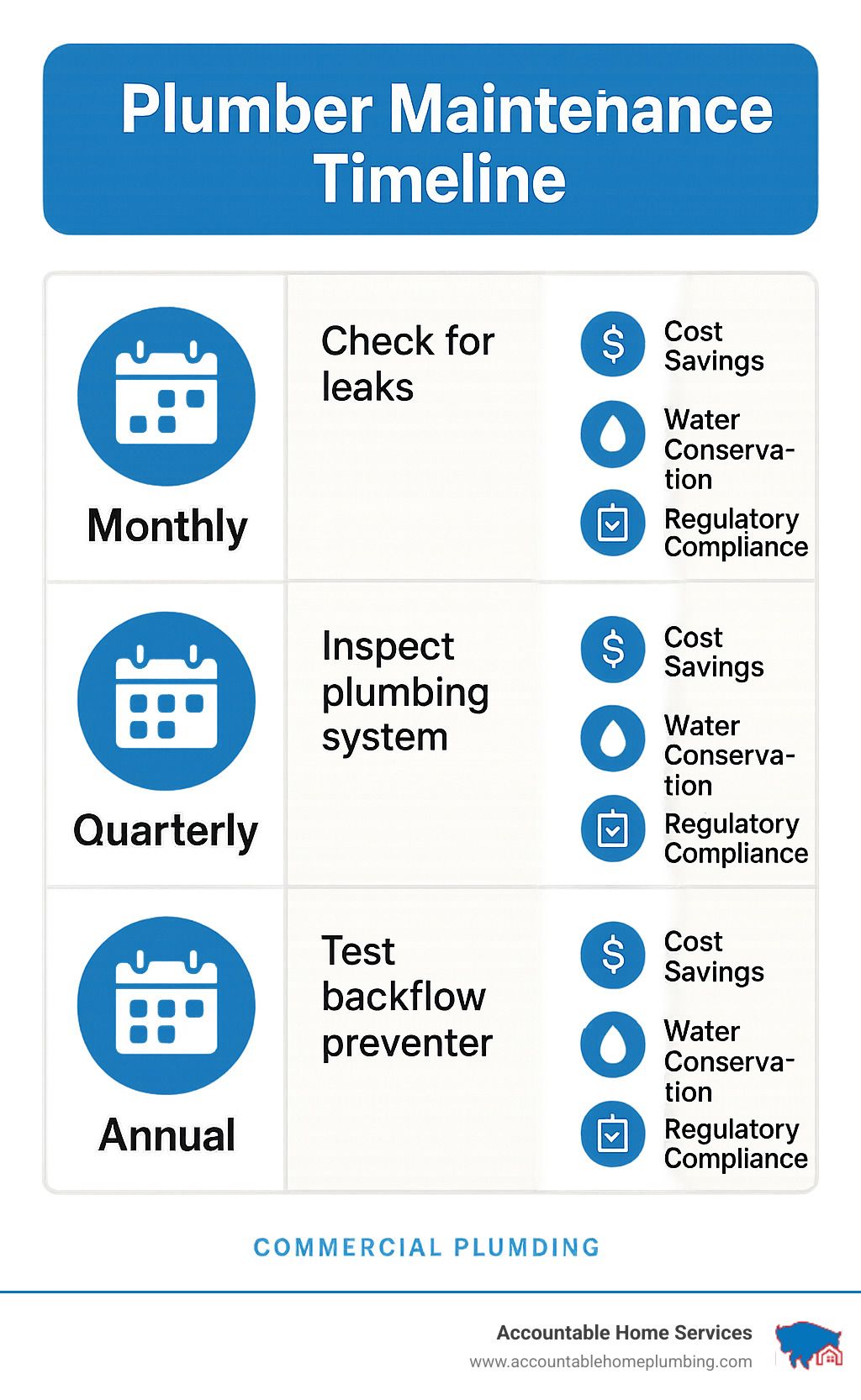
But here's what really matters: peace of mind. When you have a solid maintenance plan in place, you sleep better knowing that your business won't be shut down by a burst pipe on Monday morning. Your tenants stay happy. Your insurance company stays happy. And your bank account definitely stays happier.
Every commercial property tells a different story. Maybe you're managing a busy restaurant where grease traps need constant attention. Perhaps you oversee a medical facility where water quality can't be compromised. Or you might be responsible for an older building where aging pipes need extra care.
At Accountable Home Plumbing, we've seen it all. From the small office building in Westminster that saved $3,000 by catching a water heater problem early, to the Thornton restaurant that avoided a health department shutdown through proactive drain maintenance. These aren't just feel-good stories - they're real examples of how plumber maintenance protects real businesses every day.
We serve the entire Denver Metro area because we believe every business deserves reliable plumbing. Whether you're in Broomfield dealing with hard water issues, or in Boulder managing an older building's quirky plumbing personality, we bring the same commitment to upfront pricing and honest service.
The best part? Getting started is easy. We'll walk through your property, understand your specific challenges, and create a maintenance plan that fits your budget and schedule. No surprise fees, no pressure tactics - just straightforward advice from people who genuinely care about keeping your business running smoothly.
Don't wait for that 2 AM emergency call that costs three times more and disrupts everything. Contact Accountable Home Plumbing today and let's build a customized maintenance plan that protects your property and your peace of mind.
Learn more about our comprehensive services and find how the right plumber maintenance approach can transform your property from a constant worry into a well-oiled machine.onday morning. Your tenants stay happy. Your insurance company stays happy. And your bank account definitely stays happier.
Every commercial property tells a different story. Maybe you're managing a busy restaurant where grease traps need constant attention. Perhaps you oversee a medical facility where water quality can't be compromised. Or you might be responsible for an older building where aging pipes need extra care.
At Accountable Home Plumbing, we've seen it all. From the small office building in Westminster that saved $3,000 by catching a water heater problem early, to the Thornton restaurant that avoided a health department shutdown through proactive drain maintenance. These aren't just feel-good stories - they're real examples of how plumber maintenance protects real businesses every day.
We serve the entire Denver Metro area because we believe every business deserves reliable plumbing. Whether you're in Broomfield dealing with hard water issues, or in Boulder managing an older building's quirky plumbing personality, we bring the same commitment to upfront pricing and honest service.
The best part? Getting started is easy. We'll walk through your property, understand your specific challenges, and create a maintenance plan that fits your budget and schedule. No surprise fees, no pressure tactics - just straightforward advice from people who genuinely care about keeping your business running smoothly.
Don't wait for that 2 AM emergency call that costs three times more and disrupts everything. Contact Accountable Home Plumbing today and let's build a customized maintenance plan that protects your property and your peace of mind.
Learn more about our comprehensive services and find how the right plumber maintenance approach can transform your property from a constant worry into a well-oiled machine.

